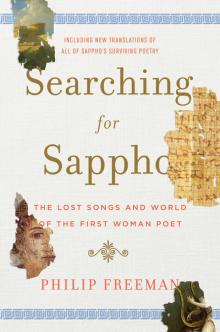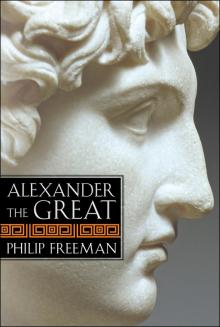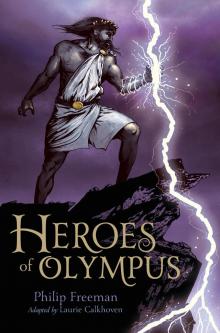- Home
- Philip Freeman
Searching for Sappho Page 16
Searching for Sappho Read online
Page 16
181.
fordable
182.
I might go
183.
downrushing
184.
danger
185.
honey-voiced
186.
Medea
187.
of the Muses
188.
weaver of tales
189.
soda
190.
many-skilled
191.
celery
192.
golden-knobbed cups
The Brothers Poem
But you are always chattering that Charaxus is coming
with a full ship. These things, I suppose, Zeus
knows and all the other gods. But you should not
worry about them.
Instead send me and ask me to call on
and make many prayers to Queen Hera
that Charaxus return here,
steering his ship,
and find us safe and sound. Everything else,
all of it, let us leave to the gods.
For fair weather comes quickly
from great storms.
Those to whom the king of Olympus wishes
to send a helpful spirit to banish toils,
these will be happy
and rich in blessings.
And we—if someday his head is freed from labor
and Larichus becomes a gentleman of leisure
—may we be delivered quickly
from great heaviness of heart.
The Cypris Poem
How can a person not be so often distressed,
Queen Cypris, about someone
you want so much to make
your own?
ACKNOWLEDGMENTS
I’M DEEPLY GRATEFUL to all the people who helped make this book possible. First, to the Institute for Advanced Study in Princeton, where I first began my research, and to Luther College, which allowed me a sabbatical to pursue my work. Thanks also to the kind scholars at the Egypt Exploration Society and the Sackler Library at Oxford University for all their help with ancient papyri and the Egyptian site of Oxyrhynchus. My gratitude as well to my guides in Egypt and on the beautiful Greek island of Lesbos. The book would not have been possible without Joëlle Delbourgo and the wonderful editors and staff at W. W. Norton, especially Jill Bialosky, Angie Shih, and Stephanie Hiebert. Thanks finally to my wife, Alison, who listened patiently to yet another of my translations from the original Greek of Sappho and offered her advice on so many aspects of the book.
NOTES
Page numbers listed correspond to the print edition of this book. You can use your device’s search function to locate particular terms in the text.
INTRODUCTION
xi “Sappho: Daughter of Simon”: Suda S 107, in Greek Lyric I: Sappho and Alcaeus, ed. David Campbell (Cambridge, MA: Harvard University Press, 2002), 4–7.
xii In ancient times it had been known as Oxyrhynchus: The best sources for the ancient city of Oxyrhynchus and the modern excavations there beginning with Grenfell and Hunt are Peter Parsons, City of the Sharp-Nosed Fish: Greek Lives in Roman Egypt (London: Weidenfeld & Nicolson, 2007); and A. K. Bowman et al., eds., Oxyrhynchus: A City and Its Texts (London: Egypt Exploration Society, 2007).
xiv “And Jesus said, ‘I stood in the middle’”: Oxyrhynchus papyrus 1, lines 11–17. These verses were published by Grenfell and Hunt in The Oxyrhynchus Papyri (London: Egypt Exploration Fund, 1898), 1:1–3. They are better known today as part of Saying 28 of the Greek-language fragments of the original Coptic Gospel of Thomas (see Bart D. Ehrman and Zlatko Plese, eds., The Apocryphal Gospels [Oxford: Oxford University Press, 2011], 342–43).
xv “. . . Nereids, grant that”: From Sappho, Poem 5 (Oxyrhynchus papyrus 1, lines 1–8), in Campbell, Greek Lyric I, 60–63. The Oxyrhynchus papyri may be found online at http://www.papyrology.ox.ac.uk/POxy.
xvii They belonged to the first woman poet: More precisely, the first woman poet whose work has survived as a part of the continuous literary tradition. Undoubtedly, many female poets preceded Sappho in human history, but their songs have been lost. One exception is the Sumerian priestess Enheduanna, who lived in the latter centuries of the third millennium BC, but her beautiful hymns were unknown until the twentieth century. See Betty De Shong Meador, Inanna: Lady of the Largest Heart (Austin: University of Texas Press, 2000).
xvii “It is not very likely that we shall find”: Grenfell and Hunt, Oxyrhynchus Papyri, 1:vi.
xviii “When I look at you even for a moment”: Sappho, Poem 31.
xx “Deathless Aphrodite on your dazzling throne”: Sappho, Poem 1.
xxiii “And on a soft bed”: Sappho, Poem 94.
xxiii “. . . for when I see you face to face”: Sappho, Poem 23.
CHAPTER ONE: CHILDHOOD
1 “Don’t worry if the others return”: Oxyrhynchus papyrus 4.744, http://www.papyrology.ox.ac.uk/POxy.
2 Infant mortality is notoriously difficult: The best introduction to childhood in ancient Greece and Rome is Judith Evans Grubbs and Tim Parkin, eds., The Oxford Handbook of Childhood and Education in the Classical World (Oxford: Oxford University Press, 2013). For infant mortality and child exposure, see Robert Garland, The Greek Way of Life (Ithaca, NY: Cornell University Press, 1990), 84–93, 108–113; Mary R. Lefkowitz and Maureen B. Fant, eds., Women’s Life in Greece and Rome: A Sourcebook in Translation (Baltimore: Johns Hopkins University Press, 1992), 187; Nancy Demand, Birth, Death, and Motherhood in Classical Greece (Baltimore: Johns Hopkins University Press, 1994), 5–8; and Robert Garland, The Greek Way of Death (Ithaca, NY: Cornell University Press, 2001), 77–88.
3 “If you have a son you raise him”: Posidippus frag. 11, in Posidippi pellaei quae supersunt omnia, eds. C. Austin and G. Bastianini (Milan: LED Edizioni Universitarie, 2002).
3 a child was not a member of its family: See Jenifer Neils and John H. Oakley, eds., Coming of Age in Ancient Greece (New Haven, CT: Yale University Press, 2003), 143–45. The description of the feast at the Amphidromia ritual is from comedy writer Ephippus (T. Kock, Comicorum atticorum fragmenta [Leipzig: Teubner, 1884], 2:251–3). The Echinos relief is discussed in Neils and Oakley, Coming of Age, 145.
4 Artemis, a virgin goddess praised by Sappho: Artemis is mentioned by Sappho in Poems 44A and 84. Philostratus (Life of Apollonius of Tyana 1.30, in Greek Lyric I: Sappho and Alcaeus, ed. David Campbell [Cambridge, MA: Harvard University Press, 2002], 20–21), also says that Sappho wrote poems to Artemis.
4 Sappho’s mother was Cleis: Oxyrhynchus papyrus 1800, in Campbell, Greek Lyric I, 2–5; Suda S 107, in Campbell, Greek Lyric I, 4–7. No one is certain what Sappho’s name means. The Greek word sappheirinos means “blue like lapis lazuli,” but the similarity to the poet’s name is probably a coincidence. She does not, in fact, call herself Sappho in her own poems (1, 65, 94, 133), but Psappho, a spelling preserved by scribes in the papyri of Egypt. It’s possible that Sappho’s name isn’t Greek at all, but a borrowing from one of the ancient languages across the narrow strait separating Lesbos from Asia.
5 “For my mother used to say”: Sappho, Poem 98A.
5 Later writers list no fewer than eight: Oxyrhynchus papyrus 1800; Suda S 107; Aelian, Miscellaneous Histories 12.19. A man from Mytilene on Lesbos, Erigyius, who shared one of the possible names of Sappho’s father, was a general in the army of Alexander the Great (Arrian, Anabasis 3.11.10).
5 “Six birthdays had passed for me”: Ovid, Heroides 15.61–62.
5 three brothers, named Erygius, Larichus, and Charaxus: Two papyri from Egypt (Oxyrhynchus papyri 1800 and 2506) list the brothers as Erygius, Larichus, and Charaxus, as does the later Suda encyclopedia (Suda S 107). See also the newly discovered “Brothers Poem,” which lists Charaxus and Larichus.
6 The most likely place is Eresus: For Eresus, Suda S 107; Palatine Anthology 7.407, in Campbell, Greek Lyric I, 48–49. For Mytilene, Oxyrhynchus papyru
s 1800; Suda S 108, in Campbell, Greek Lyric I, 6–7.
6 The year of Sappho’s birth: Ancient evidence is in Strabo 13.2.3; Athenaeus, Learned Diners 13.598bc–599cd; Suda S 107; Parian Marble ep. 36, in Campbell, Greek Lyric I, 8–9; Eusebius, Chronicle Ol. 45.1, in Campbell, Greek Lyric I, 8–9. See G. O. Hutchinson, Greek Lyric Poetry: A Commentary on Selected Larger Pieces (Oxford: Oxford University Press, 2001), 139–40.
7 Sappho lived during a revolutionary period: For a survey of the period, see L. H. Jeffery, Archaic Greece: The City States c. 700–500 B.C. (London: Methuen, 1978); Anthony Snodgrass, Archaic Greece: The Age of Experiment (Berkeley: University of California Press, 1981); Nigel Spencer, “Early Lesbos between East and West: A ‘Grey Area’ of Aegean Archaeology,” Annual of the British School at Athens 90 (1995): 269–306; Jonathan M. Hall, A History of the Archaic Greek World: ca. 1200–479 BCE (Malden, MA: Wiley-Blackwell, 2014).
8 Boys and girls played with toys: See Neils and Oakley, Coming of Age, 264–82.
8 “The children put purple reins on you”: Palatine Anthology 6.312.
10 “Evening, you gather together”: Sappho, Poem 104A.
10 “From his earliest years”: Homeric Problems 1 = D. A. Russell and D. Konstan, eds., Heraclitus: Homeric Problems (Atlanta: Society of Biblical Literature, 2005), 2.
11 The Greek historian Xenophon: Xenophon, Oeconomicus 7.
11 Many of the images of female children: For example, Neils and Oakley, Coming of Age, 61, 119.
11 There were even wool-working contests: Ibid., 118.
11 Girls in the military-dominated city of Sparta: Xenophon, Constitution of the Spartans 1.4.
11 As an aristocratic girl: A fragmentary papyrus commentary of the first or second century AD does claim that Sappho was a good and industrious housekeeper (Oxyrhynchus papyrus 2506, frag. 48).
12 aside from garlands of flowers: Sappho, Poem 125.
12 Plato reportedly had two women: Diogenes Laertius, Lives of Famous Philosophers 3.46.
12 to think of Sappho as the leader of a school: Marguerite Johnson, Sappho (Bristol, England: Bristol Classical Press, 2007), 13–14.
13 One ancient Greek writer even claimed: Menaechmus in Athenaeus, Learned Diners 14.635b.
13 a plectrum, which Sappho also reportedly invented: Suda S 107.
14 “You seemed to me a small child without grace”: Sappho, Poem 49. It is quoted by Plutarch (Dialogue on Love 751d), who says that Sappho is addressing a girl too young for marriage.
14 “. . . you will remember”: Sappho, Poem 24A.
14 “. . . into a deep wave”: Erinna, Distaff 5–21.
16 Sappho mentions a similar monster: Sappho, Poem 168A.
16 “my knees that once danced nimbly”: Sappho, Poem 58.
17 “I sing of the light of Agido”: Alcman, Partheneion 1.39–49.
18 “With desire that makes my limbs loose”: Ibid., 3.61–72.
19 “At seven I became Bearer of Secret Things”: Aristophanes, Lysistrata 643–46. See Mark Golden, Children and Childhood in Classical Athens (Baltimore: Johns Hopkins University Press, 1990), 76–79; Neils and Oakley, Coming of Age, 149–53.
CHAPTER TWO: WEDDING SONGS
23 “Let your bride be”: Hesiod, Works and Days 698–99.
23 The Byzantine Suda encyclopedia says: Suda S 107, in Greek Lyric I: Sappho and Alcaeus, ed. David Campbell (Cambridge, MA: Harvard University Press, 2002), 4–7. We know of several ancient comedies featuring Sappho as the main character that date from as early as the fifth century BC. See David A. Campbell, Greek Lyric Poetry (Bristol, England: Bristol Classical Press, 1990), 5n4; Marguerite Johnson, Sappho (Bristol, England: Bristol Classical Press, 2007), 23.
24 The poet Hesiod: Hesiod, Works and Days 695–96. For the ideal age of marriage for men and women in ancient Greece, see Robert Garland, The Greek Way of Life (Ithaca, NY: Cornell University Press, 1990), 210–13.
25 The philosophers Plato and Aristotle: Plato, Laws 6.785b; Aristotle, Politics 7.1335a.
26 It was also widely believed: Soranos, Gynecology 1.33.
26 A Hippocratic treatise on illnesses: Hippocrates, Illnesses Affecting Virgins 1. See Garland, Greek Way of Life, 168–70.
27 a beautiful and clever princess named Nausicaa: Homer, Odyssey 6.273–89.
28 “ ‘Don’t refuse me, dear . . .’ ”: Archilochus frag. 196a.
29 “I urge you not to slip and fall, my dears”: Aeschylus, Suppliants 996–1005.
29 But it’s Sappho herself: For an excellent discussion, see Johnson, Sappho, 112–21. It is possible that these two fragments come from different poems, but it seems unlikely.
30 “. . . like the sweet apple that grows red”: Sappho, Poem 105A.
30 “. . . like the hyacinth shepherds tread underfoot”: Sappho, Poem 105B. Demetrius, On Style 140.
31 “‘Virginity, virginity, where have you gone?’ ”: Sappho, Poem 114. Demetrius, On Style 140.
32 An intriguing passage by: Herodotus 1.93. Herodotus also claims that all Lydian women of the common class worked as prostitutes to earn money for their dowries.
32 The sixth-century aristocrat Callias: Herodotus 6.122.
32 Helen of Troy: Euripides, Iphegenia at Aulis 68–69.
32 “Come now, you suitors”: Homer, Odyssey 21.73–77.
34 “O fortunate son of Laertes”: Ibid., 24.192–98.
34 “A man couldn’t gain anything better”: Hesiod, Works and Days 702–6.
35 “In the beginning Zeus created”: Semonides 7.
36 “For me it would be better”: Homer, Iliad 6.410–12, 429–30.
37 “Mighty goddess, do not be angry with me”: Homer, Odyssey 5.215–20.
37 “FATHER: I give you this girl”: Menander, Perikeiromene 435–37. See Garland, Greek Way of Life, 217–18.
38 In Homeric times: For example, Homer, Odyssey 16.390–92.
38 but the scene is not found in Homer: Homer does include a brief description of a wedding in a passage portraying the shield of Achilles (Iliad 18.491–95).
39 “Cyprus . . . / the herald came . . .”: Sappho, Poem 44. See Johnson, Sappho, 61–66, 102–5.
43 “. . . for once you were a child”: Sappho, Poem 27.
44 “No mortal may go soaring to the heavens”: Alcman 1.16.
45 “Truly, sweet mother, I cannot weave”: Sappho, Poem 102.
46 “. . . bride with beautiful feet”: Sappho, Poem 103B. See Johnson, Sappho, 105–6.
46 but in the earlier Greek poetic tradition: Homer, Iliad 14.186; Hesiod, Theogony, 507.
46 “Blessed bridegroom, your wedding”: Sappho, Poem 112.
47 “for never, / bridegroom, was there another girl like this one”: Sappho, Poem 113.
47 “To what, dear bridegroom”: Sappho, Poem 115.
48 “Farewell, bride”: Sappho, Poem 116. See also Poem 117.
48 “loosen the pure virgin’s girdle”: Alcaeus, Poem 42.
49 “Sappho makes cheap fun”: Demetrius, On Style 167.
49 a Byzantine churchman was still complaining: Michael of Italy, Address to Michael Oxites (see Eva-Maria Voigt, ed., Sappho et Alcaeus: Fragmenta [Amsterdam: Athenaeum, 1971], 155 Campbell, Greek Lyric Poetry, 140–41).
49 “Raise high the roof—”: Sappho, Poem 111.
50 “The door-keeper’s feet are as long as”: Sappho, Poem 110.
50 “virgins . . . / all night long . . .”: Sappho, Poem 30. See Johnson, Sappho, 120–21.
52 “The rest of the Trojan women”: Homer, Odyssey 4.257–64.
52 “You came along, Helen”: Ibid., 4.273–79.
53 he offers Achilles seven female slaves from Lesbos: Homer, Iliad 9.128–30.
54 This is followed by more practical advice: Plutarch, Advice on Marriage 1, 9, 11, 18, 19, 35.
55 “We have prostitutes for sexual pleasure”: Pseudo-Demosthenes 59.122.
55 “Surely you don’t think men have children”: Xenophon, Memorabilia 2.2.4.
56 A woman
who committed adultery: Demosthenes 59.86–87.
CHAPTER THREE: A MOTHER’S LOVE
57 “I have a beautiful child”: Sappho, Poem 132.
57 a fragmentary papyrus scroll: Oxyrhynchus papyrus 1800, frag. 1, http://www.papyrology.ox.ac.uk/POxy.
57 the Byzantine Suda encyclopedia: Suda S 107, in Greek Lyric I: Sappho and Alcaeus, ed. David Campbell (Cambridge, MA: Harvard University Press, 2002), 4–7.
58 “For my mother used to say”: Sappho, Poems 98A and 98B.
60 the same Greek word used by Homer: For example, Iliad 1.197 (Achilles); Odyssey 13.399 (Odysseus).
60 “I have a beautiful child”: Sappho, Poem 132.
60 with Homer reserving it only for sons: For example, describing Telemachus in Odyssey 2.365.
61 “About Cleis later on”: David A. Campbell, Greek Lyric Poetry (Bristol, England: Bristol Classical Press, 1990), 196–97.
63 A woman’s primary role in ancient Greece: For this section, I am indebted to the excellent primary sources on and discussion of conception, pregnancy, and childbirth in Robert Garland, The Greek Way of Life (Ithaca, NY: Cornell University Press, 1990), 17–105.
63 “The mother is not the begetter of the child”: Aeschylus, Eumenides 658–59.
63 One ancient medical text tells the story: Soranus, Gynecology 1.39.
64 Aristotle also advised: Aristotle, History of Animals 7.3.
64 Insertion into the vagina: Superfetation 32–39.
64 Other aids to conception: Soranos, Gynecology 1.38–41; Hesiod, Works and Days 735ff.
64 It was also believed that men: Aristotle, Generation of Animals 1.718.
65 “Nature . . . takes a portion from each partner”: Plutarch, Advice on Marriage 20.
66 “During intercourse when a man”: Soranus, Gynecology 1.61.
66 One Greek physician: Nature of the Child 13.
67 Various kinds of ointments: See, for example, Soranus, Gynecology 1.61.
67 Other doctors prescribed a meal: Nature of Women 98.
68 “For abortions are more painful than birth”: Illnesses of Women 1.72.
68 Soranus recommended: Soranus, Gynecology 1.64–65.

 Searching for Sappho
Searching for Sappho Saint Brigid's Bones
Saint Brigid's Bones Alexander the Great
Alexander the Great Heroes of Olympus
Heroes of Olympus Sacrifice
Sacrifice